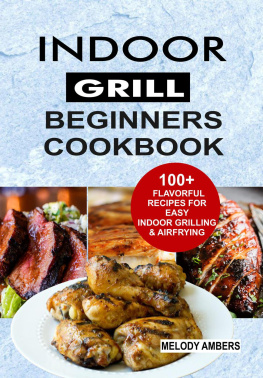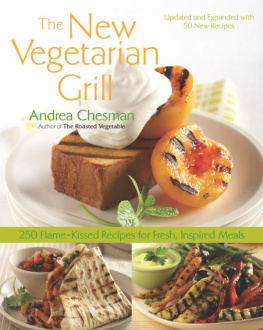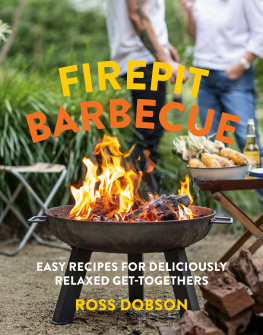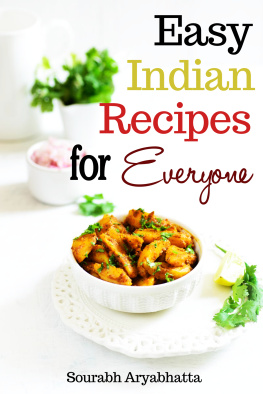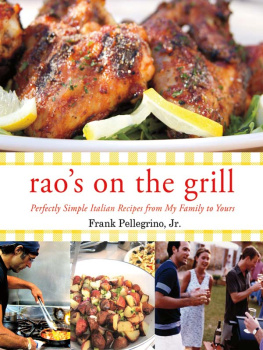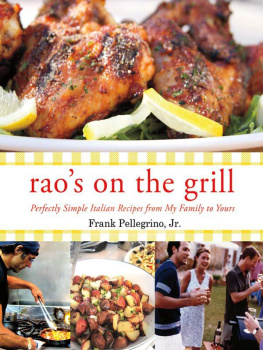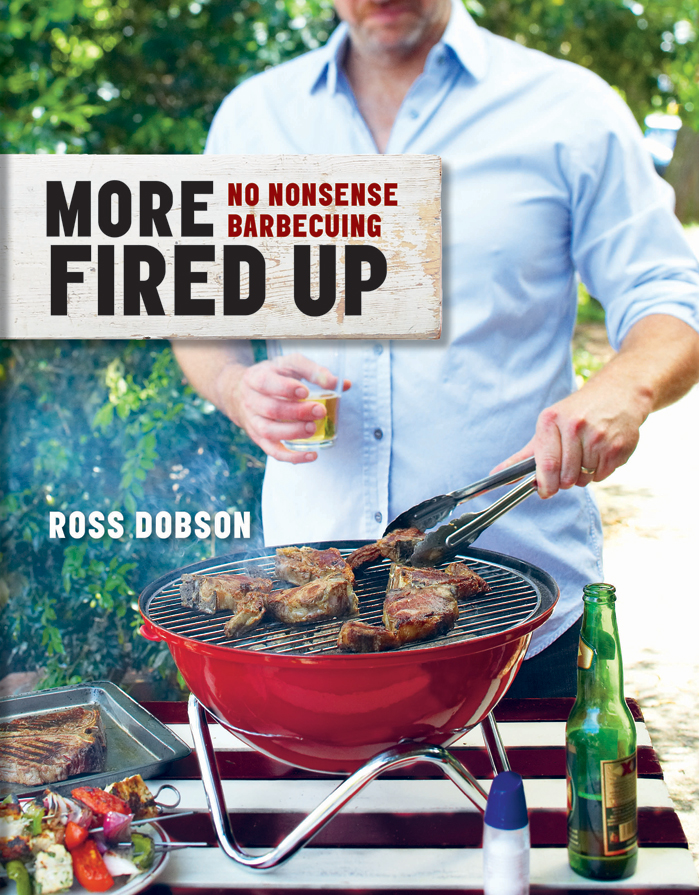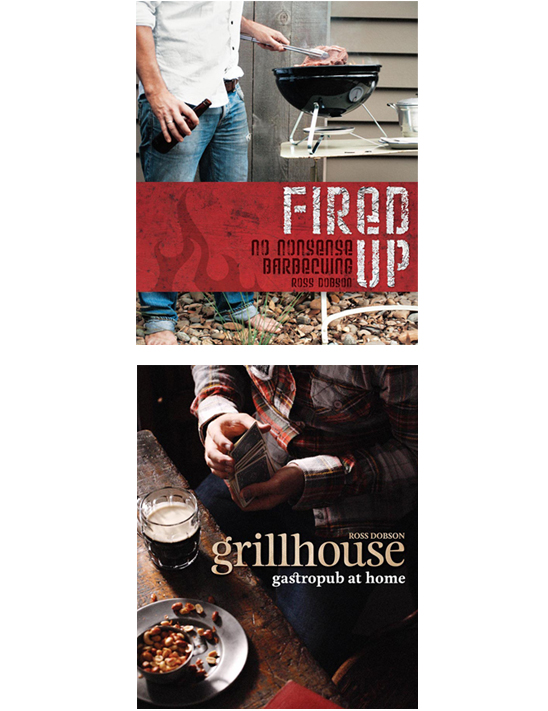CONTENTS
METAL ON HEAT. MEAT ON METAL.
SINCE I WROTE THE ORIGINAL FIRED UP, LITTLE HAS CHANGED in the world of barbecuing. Actually, one might say little has changed in the world of barbecuing since the dawn of man, give or take a few minor advancements, such as the Iron Age and discovery of fossil fuels. But, really, it is all pretty much the same. Its back to basicsusing heat to cook food by the most elemental means available. Fire.
Barbecuing, well my notion of barbecuing, is about producing tasty, no nonsense food. This is my mantra. When I worked on the recipes for Fired Up I had little more than the most basic of barbecues. A grill plate and a hotplate set over some gas burners with a rather flimsy lid. All the same, I was pretty bloody happy with what my old barbecue producedsimple, tasty, no nonsense food.
I had that barbecue for six happy years. It was hard to let go when its time was up. It wasnt until rust won out and the burners simply disintegrated that I was forced to say goodbye. But there were exciting times ahead as I went in search of a new barbecue. A sturdy, sexy, stainless steel number, with a lid, a window to perve through and a thermometer.
I use my new barbecue as an oven of sorts. Most of the modern barbecues have lids and mine, with its stainless steel casing, both conducts and radiates heat really well. So, when cooking big cuts of meat, like whole lamb and pork shoulders, rib eye roast, sides of sirloin, even whole chickens and fish, I preheat the grill and hotplate burners to high and close the lid. You will see the thermometer rise and the internal temperature will act like that in an oven. So when you put the pork or whatever in, the skin will immediately start to cook. You can of course then turn the temperature down and cook the meat to your liking.
In barbecuing I can never deny my roots. I am Australian with a unique attitude towards barbecuing. I relish in our cultural diversity, which brings to us food, flavours and influences from afar. Combine our style of cooking and access to such fine ingredients and you have really tasty food that can be made with ease. And fancy barbecue or not, I think this is how most of us like to barbecue. A few flavours and a flame later, you have something that you cant wait to cook again.
In a sense, barbecuing allows us to be masters, or mistresses, of our domain.
We are the masters of flavour. It really is up to you how the food will taste. It really is up to you how tender the meat is, in terms of cooking time and utilising different cuts of meat. Before the meat goes on the barbecue, remember to season well just before cooking and once on, dont continuously (and mindlessly!) turn the meat on the barbecue and always allow the meat to rest after being cooked.
I am lucky enough to have a front verandah with room to spare for my barbecue and me. It is one of those federation-style verandahs with no logical explanation as to why exactly it needs to be so big. But whos complaining? Its a beauty. Sun-drenched and north-facing, with just the right amount of shade. Rain, hail or shine, summer or winter, I can barbecue to my hearts content on the front verandah, waving at neighbours and passers-by. Sound sociable? It is. Barbecuing is as much about having fun as anything else. Relax, enjoy, and you are halfway there to really good food.
A FEW SIMPLE HOT TIPS
YOUR FOOD
Preheat the barbecue before cooking. You want to hear a healthy sizzle as the food hits the hotplate or grill. A barbecue is not for stewing or simmering.
Closing the lid of the barbecue will keep the heat in and create a hot-oven effect. Even if Im only using part of the barbecue, I sometimes turn all the burners on and close the lid. So when the food is put on the barbecue (like a leg of lamb, a turkey breast or beef fillet) it will start to cook immediately and the internal heat will cook it evenly and quickly.
Before you even think of cooking the food, remove it from the fridge. This is really important. A fridge-cold, thick steak cooked to rare will still be cold in the centre. Chicken is another story of course. It does have nasty bugs, which can make people sick, but not all meat has the same bugs. It doesnt work that way. Let your beef, lamb and pork come to room temperature before cooking. Food hygiene is important but lets not get too carried away.
Season your food well before cooking but not too far in advance or it will make the meat tough. A light sprinkling of sea salt 30 minutes prior to cooking is all thats needed.
Always allow meat to rest after cooking. Give big bits of meat, like whole sirloin, beef fillet or whole birds, a good 2030 minutes rest, covered with some cooking foil. Steaks will need less time to rest, but do rest them nonetheless.
A hot surface will actually prevent the food from sticking. And allowing the food to develop a crust lets you turn the food without it tearing. This is especially the case with fish skin. (And keep in mind that defrosted, frozen fish is a nightmare to turn without tearing or breaking the flesh. Cooking the fish on a sheet of baking paper will prevent this.)
And for some reason when we are standing at the barbecue we do feel like we need to incessantly do stuff to the food, like constantly turning the meat. Dont do this as it will ruin the meat. Except for sausages. They dont count and you can turn them as often as you like.
YOUR EQUIPMENT
Keep your barbecue reasonably clean but dont go overboard. I know a guy who actually uses an angle grinder to clean his hotplate. This is a tad extremebut he does do the best crispy-skinned fish on it!
Some people recommend cleaning the barbecue while it is hot. But who wants to do that? When you finish cooking you really just want to be with the people you have cooked for, not putting the cleaning gloves on. To clean, simply use a bit of warm soapy water and some elbow grease. Turn the barbecue on low heat to dry it out then wipe over with some cooking oilthis will help prevent rust from setting in.
If you really want to clean the barbie while it is still hot, I reckon the best thing to do is give it a good hosing down. This will get rid of most of the gunk and the water will evaporate super fast, reducing rust. (In taking this option, I am assuming your barbecue is in a backyard and not on an apartment balcony.)
Speaking of rust, this is something out of our control, considering most barbecues are left outdoors, year round. If the hotplates or grills start to rust it is time to replace them, people. And do look at the burners underneath. Rusty burners can collapse mid-barbie. (That would be a disaster, and somewhat disconcerting.) Replacing these things is neither expensive nor difficult. New hotplates and grills are sold separately at barbecue stores. I actually use a barbecue hotplate on the gas hobs on my kitchen stove for some pretty good indoor grilling results.




